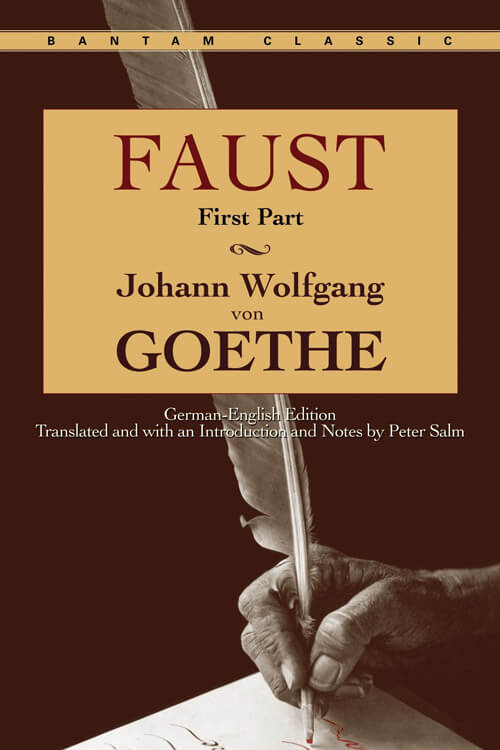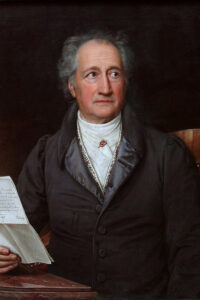
Faust
For there are few things which may not be said, in English, in a twofold manner—one poetic, and the other prosaic. In German, equally, a word which in ordinary use has a bare prosaic character may receive a fairer and finer quality from its place in verse. The prose translator should certainly be able to feel the manifestation of this law in both languages and should so choose his words to meet their reciprocal requirements. A man, however, who is not keenly sensible to the power and beauty and value of rhythm, is likely to overlook these delicate yet most necessary distinctions. The author’s thought is stripped of a last grace in passing through his mind and frequently presents very much the same resemblance to the original as an unhewn shaft to the fluted column. Mr. Hayward unconsciously illustrates his lack of a refined appreciation of verse, “in giving,” as he says, “a sort of rhythmical arrangement to the lyrical parts,” his object being “to convey some notion of the variety of versification which forms one great charm of the poem.” A literal translation is always possible in the unrhymed passages, but even here Mr. Hayward’s ear did not dictate to him the necessity of preserving the original rhythm.
While, therefore, I heartily recognize his lofty appreciation of Faust,—while I honor him for the patient and conscientious labor he has bestowed upon his translation,—I cannot but feel that he has himself illustrated the unsoundness of his argument. Nevertheless, the circumstance that his prose translation of Faust has received so much acceptance proves those qualities of the original work that cannot be destroyed by a test so violent. From the cold bare outline thus produced, the reader unacquainted with the German language would scarcely guess what glow of color, what richness of changeful life, what fluent grace and energy of movement have been lost in the process. We must, of course, gratefully receive such an outline, where a nearer approach to the form of the original is impossible, but, until the latter has been demonstrated, we are wrong to remain content with the cheaper substitute.
It seems to me that in all discussions on this subject, the capacities of the English language have received but scanty justice. The intellectual tendencies of our race have always been somewhat conservative, and its standards of literary taste or belief, once set up, are not varied without a struggle. The English ear is suspicious of new meters and unaccustomed forms of expression: there are critical detectives on the track of every author, and a violation of the accepted canons is followed by a summons to judgment. Thus the tendency is to contract rather than to expand the acknowledged excellence of the language.
Read or download Book
Johann Wolfgang von Goethe
Johann Wolfgang (von) Goethe (28 August 1749 – 22 March 1832) was a German polymath and writer, who is widely regarded as the greatest and most influential writer in the German language.
Biography.
His work has had a profound and wide-ranging influence on Western literary, political, and philosophical thought from the late 18th century to the present day. Goethe was a German poet, playwright, novelist, scientist, statesman, theatre director, and critic. His works include plays, poetry, literature, and aesthetic criticism, as well as treatises on botany, anatomy, and color.
Goethe took up residence in Weimar in November 1775 following the success of his first novel, The Sorrows of Young Werther (1774). He was ennobled by the Duke of Saxe-Weimar, Karl August, in 1782. Goethe was an early participant in the Sturm und Drang literary movement. During his first ten years in Weimar, Goethe became a member of the Duke’s privy council (1776–1785), sat on the war and highway commissions, oversaw the reopening of silver mines in nearby Ilmenau, and implemented a series of administrative reforms at the University of Jena. He also contributed to the planning of Weimar’s botanical park and the rebuilding of its Ducal Palace.
Goethe’s first major scientific work, the Metamorphosis of Plants, was published after he returned from a 1788 tour of Italy. In 1791 he was made managing director of the theatre at Weimar, and in 1794 he began a friendship with the dramatist, historian, and philosopher Friedrich Schiller, whose plays he premiered until Schiller died in 1805. During this period Goethe published his second novel, Wilhelm Meister’s Apprenticeship; the verse epic Hermann and Dorothea, and, in 1808, the first part of his most celebrated drama, Faust. His conversations and various shared undertakings throughout the 1790s with Schiller, Johann Gottlieb Fichte, Johann Gottfried Herder, Alexander von Humboldt, Wilhelm von Humboldt, and August and Friedrich Schlegel have come to be collectively termed Weimar Classicism.
The German philosopher Arthur Schopenhauer named Wilhelm Meister’s Apprenticeship one of the four greatest novels ever written, while the American philosopher and essayist Ralph Waldo Emerson selected Goethe as one of six “representative men” in his work of the same name (along with Plato, Emanuel Swedenborg, Montaigne, Napoleon, and Shakespeare). Goethe’s comments and observations form the basis of several biographical works, notably Johann Peter Eckermann’s Conversations with Goethe (1836). His poems were set to music by many composers including Mozart, Beethoven, Schubert, Berlioz, Liszt, Wagner, and Mahler.






